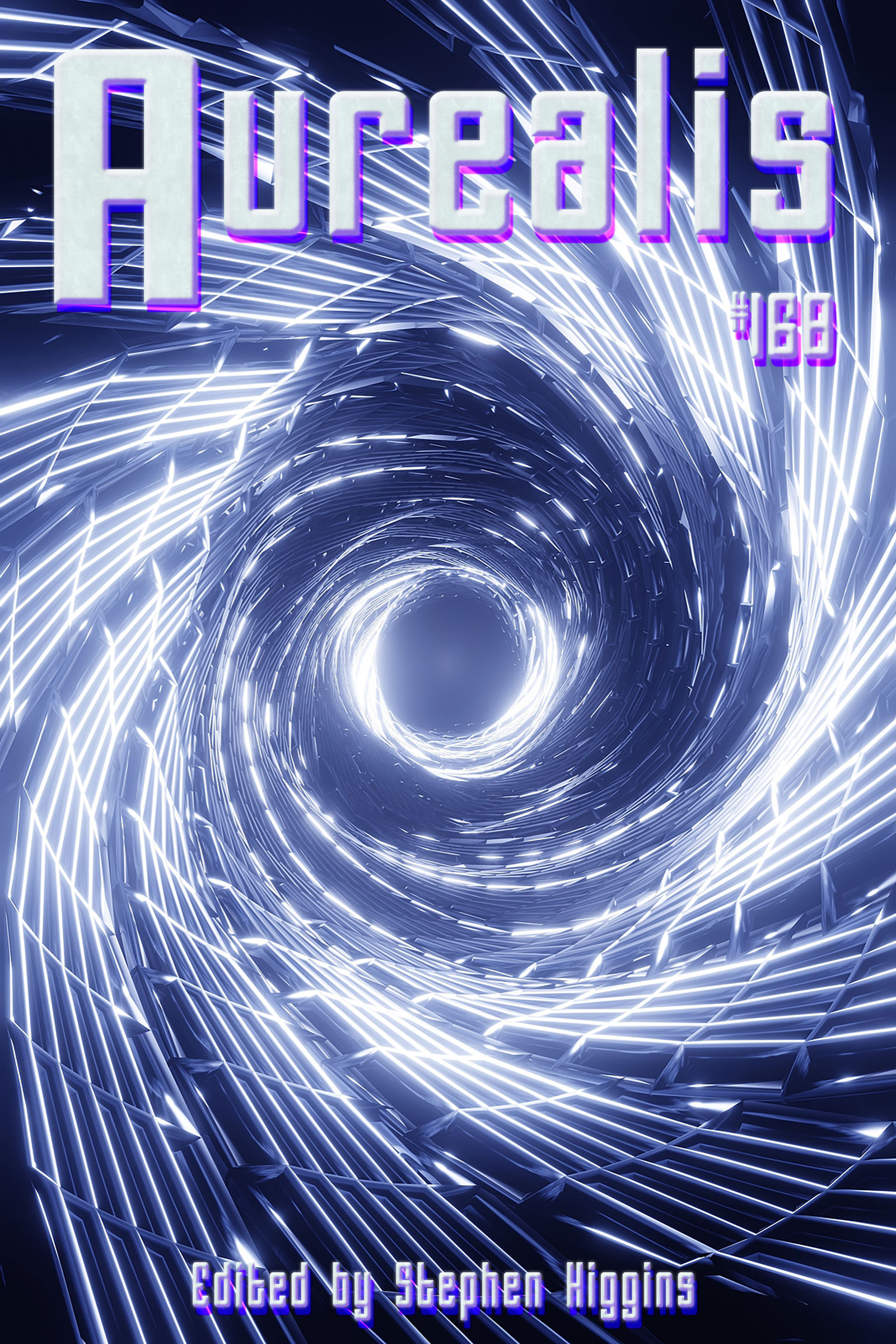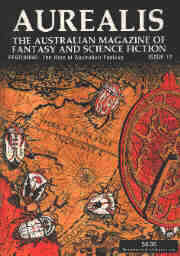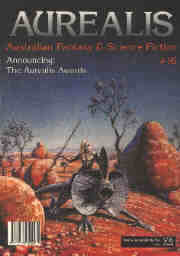Aurealis #168
$3.99
Aurealis #168 has plenty of new fiction, interesting articles and in depth reviews. It also has fantastic artwork and a really whizzy cover!
- From the Cloud — Stephen Higgins
- Hell Is Other People — Michael Pryor
- The Temple of the Hungry Moon — L B Hazelthorn
- All Quiet in the Calabast Night — Andrew Kao
From the Cloud
Stephen Higgins
I am assuming I’m not the first to do this, but I wanted to write an editorial about using AI in fiction writing. I was going to mention that, like many other magazines, we are not accepting stories or illustrations created with AI. So I did what any editor who has trouble coming up with editorial topics would do and asked AI to write an editorial for me. It was bloody awful. See for yourself:
In the ever-evolving landscape of science fiction, where the boundary between imagination and reality blurs, we find ourselves at the cusp of a literary revolution. The age-old craft of editorial writing, a realm once dominated by human minds, is now witnessing the seamless integration of artificial intelligence, ushering in a new era of creativity and innovation.
Wow! Cliché city! It is all a bit flowery for my taste, and I think most readers would pick that I did not write that. Anyway, I guess that translates as ‘AI is taking over’. Well, maybe just the age-old craft of editorial writing’ or ‘realm’… The old AI can’t seem to make up its mind.
It continues:
As we embark on this futuristic journey, the question arises: Can AI truly contribute to the art of crafting compelling editorials that resonate with the essence of human thought and emotion?
Now, here I’d leave a little pause, then add, ‘Well, do ya, punk?’ But anyway, I hope this is resonating with your essences so far.
The answer, we believe, lies not in the replacement of human creativity but in the symbiosis of the human mind with the limitless possibilities offered by artificial intelligence.
Look at me being all symbiotic.
AI, with its unparalleled ability to process vast amounts of information and discern patterns, offers an exciting avenue for editorial exploration. Imagine an editorial assistant that can sift through mountains of data, distilling complex concepts into eloquent prose at the speed of thought.
See it’s this sort of big noting of itself that is getting AI a bad rep. Tone it down, big fella. Be humble.
AI algorithms, trained on a diverse range of literary works, can generate unique ideas and perspectives that may elude even the most seasoned human writers.
Wow. I mean, it just came right out and said it! It is better than us!
Picture an editorial team where AI serves as the brainstorming partner, suggesting innovative angles and helping to refine the language to achieve the perfect blend of clarity and creativity.
Ah, yes, but how long will AI be content to just be the ‘brainstorming partner’? How long will it be satisfied to just suggest and help?
In this issue, we invite you to join us on a voyage into the uncharted realms of AI-infused editorial excellence.
You can just feel the AI-infused editorial excellence leaping off the page can’t you?
And the AI-produced editorial ends with:
Welcome to a new era of storytelling, where the pen is not just mightier than the sword but is now guided by the intelligence of tomorrow.
Well, for starters, there has not been a pen involved in this at all. And I am not too happy about it all being ‘guided by the intelligence of tomorrow’. That’s a bit of a giveaway isn’t it? I saw the Terminator movies. I know Skynet-type longing in a machine when I see it and I am looking at it right now.
I suppose my point is that we do not want AI-created stories or illustrations in Aurealis. At this early stage, it is fairly easy to pick and we would not look favourably on any submission that had a whiff of AI about it. Quite apart from the ethical concerns surrounding how AI is being trained, it just doesn’t read well.
All the best from the cloud!
Stephen Higgins
From Hell Is Other People by Michael Pryor:
When you’re a demon, if someone asks you what sort of shape you’re in, you really have to pause before answering. Demon shape? Human shape? Something else entirely? My demon shape, these days only assumed when I’m back in Hell on one of my rescue and recovery missions, is suave, stylish and sophisticated, in demon terms. Somewhere between two and three metres tall, depending on what’s needed, claws, fangs, scales, and, of course, the bat wings. Can’t do without those bat wings. My human shape, my everyday wear here on the upper world, is male, robust enough, no-nonsense dark hair and eyes mostly because the glowing red demon eyes are just so much of a giveaway. Regardless, I’m in shape whatever shape I’m in.
From The Temple of the Hungry Moon by L B Hazelthorn:
I have always lived in this temple, in the village of Red Fish. Near to the River, near to the city of Larsa.
I do not live in the great city of Urek. My brother priests and sister priests, we do not live in the great city of Urek where the King dwells, where the streets swarm like a nest of ants.
We have a temple. It is not great. But we have a God.
Gudea is head priest. He herds the sacrificial beasts. I am Dipti, and I light the clay lamps and open the veils and assist the people, most days, who come to the outer court and make their pleas to the unseen one within. And sometimes when Gudea is busy, or ill with the smell of the Pool, I assist.
I am polite, I address the God with great humility, I do not raise my eyes when I bring fresh incense. But I speak to it as I work.
Gudea said we must beg forgiveness if we raise our voices.
I think if the God minded, it would eat me.
From All Quiet in the Calabast Night by Andrew Kao:
‘I think you’ll like Calabast,’ I smile, warming my hands on the sides of my cup. ‘It’s changed a lot in the twenty years since you left. They’re the most friendly people you’ll ever meet. No more incursions or assassinations, I’ll tell you that.’
I try laughing at the end of my little joke, but it comes out strangled as the bitterness of the tea scalds my tongue. I cough and set my cup down, clearing my throat.
‘I am sure they are friendly,’ Baba says, slowly sipping from his cup. He looks out the window and into the dark street. Two drunk Imperial soldiers lean against each other as they carouse down our alleyway, kings of their own small world. ‘But I have no desire to vacation in a land where I once campaigned. And I’ll miss meeting the other veterans this week for it.’




